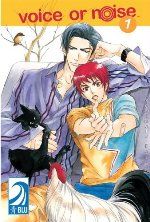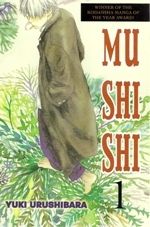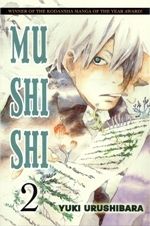The nifty manga blogger, Kethylia, allows me to post her weely reviews every Monday here on the blog, to share with you good folks. Here is a link to her site, which she describes as "an informal brain-dumping ground for off-the-cuff book and manga reviews, news commentary, leftist political rants, half-baked pretensions of intellectualism, and lots, lots more!"
Enjoy!
Here is a description of her rating scale.
Enjin, Yamimaru. Voice or Noise. Vol. 1. Los Angeles: BLU, 2007.
Summary: Middle school student Shinichiro's dog is acting strangely, and the vet advises him to go consult with Narusawa, a physics professor who can talk to animals! Despite Narusawa's cold demeanor, Shinichiro finds him captivating and wants to be able to talk to animals just like him. But, of course, the development of their relationship proves to be a rocky one; for Narusawa, who can communicate with all living things, actually understands very little about them.
Comments: I'm not, generally speaking, a big fan of Tokuma Shoten's BL. The stories are uniformly sentimental, (largely) de-sexed, and prosaic--and, unless the mangaka in question is a skilled one, unbearably dull. Fortunately, Enjin managed to stumble upon an interesting Dr. Doolittle-like premise for this, her first pro series, and even asks some morally pertinent questions about how far and to whom one ought to be obligated to extend one's sympathies. (She also has a snarky, magical black cat sidekick, which, since the days of Sailor Moon, has become a classic, much-loved narrative device.) I can't help but notice, however, that the age difference between the primary "couple" of the piece is quite dramatic--underaged boy and man twice as old as he; unless the author ages Shinichiro significantly in the next volume, the relationship is likely to remain mostly platonic... Just fair warning for any in the market for the erotic.
Notes: paperback, 1st American edition; first published in Japan by Tokuma Shoten in 2002
Rating: 5.5/10 - Not great, true, but it's not all that bad. Which is a pretty high compliment for a boy's love series, if you ask me.
Urushibara, Yuki. Mushishi. Vol. 1. Trans. William Flanagan. New York: Del Rey, 2007.
Summary: Ginko is a mushishi, an expert on primordial forms of life known as mushi. This volume's five stories tell variously about a woman who became a mushi for the sake of her grandchild, a boy who has grown horns so the mushi in his ear can feed of silence, a man whose dreams come true, a girl whose eyes have been infected by mushi, and a young woman who almost accompanies a liquid mushi to its death at sea.
Comments: Urushibara is a brilliant storyteller and a gifted artist, her work steeped in tradition and understated sentiment. Her world-building (the Japanese adjective "fushigi," which means both mysterious and wondrous, comes to mind) is idiosyncratic yet entirely coherent and easily-comprehensible, effectively embroidering pre-existing Japanese superstition and myth. Yet, oddly, she was not especially popular in her previous incarnations as a girls' comic artist. Thank goodness Kodansha's Afternoon finally saw fit to publish her work; if she hadn't won the contest that got Mushishi into the magazine as a new serial, she would surely have given up manga creation entirely! I'm so glad that her career, cemented by receipt of a Kodansha Manga Award, is now assured--Urushibara has a gift to give to the world, and now she has the opportunity to utilize her talents to their fullest extent.
Notes: paperback, 1st American edition, 2nd printing; first published in Japan by Kodansha in 2000
Rating: 8/10 - One of those rare manga series that resonates with all of the affective spirituality and mystery of the Japanese fairytale.
Urushibara, Yuki. Mushishi. Vol. 2. Trans. William Flanagan. New York: Del Rey, 2007.
Summary: In the second volume's five stories, Ginko encounters a mountain master who wishes to return his powers to the mushi, a young woman who can only dispel her curse by recording the tales of mushishi, a parasite mushi who shares its intense life experience with its human hosts, a bridge architect in pursuit of a rainbow-like mushi, and a fungal mushi that distributes its spores by budding off appendages that look like children.
Comments: I might point out, with no little self-satisfaction, that Mushishi is another one of those manga series that I was praising to the skies during my college days (back when I read a heck of a lot more manga than I do now). Yet, as late as October 2006, my extra copies of the first three volumes of the Japanese edition went ignored and unwanted by everyone except a professional translator. Ah, and they were such beautiful books, those Japanese editions. High quality paper stock, full color pages, navy blue endpapers. The Del Rey editions, despite being over twice the price (and two dollars more than their baseline manga list price), look like poor cousins by comparison. But at least the translation's good--the textual quality of the original book, particularly enriched in this volume by a touch of romance, a touch of horror, has not been compromised...even though, alas, the paratextual quality most certainly has.
Notes: paperback, 1st American edition; first published in Japan by Kodansha in 2002
Rating: 9/10 - Urushibara extends the range of her storytelling further. Even better than the first volume.




